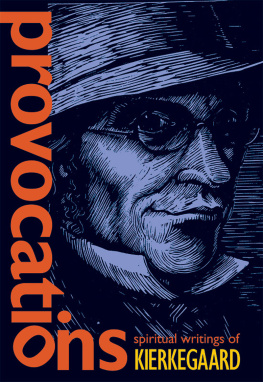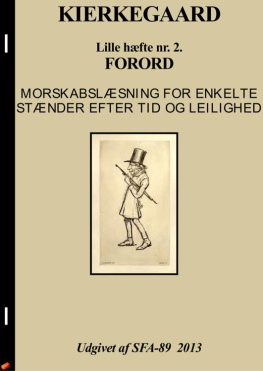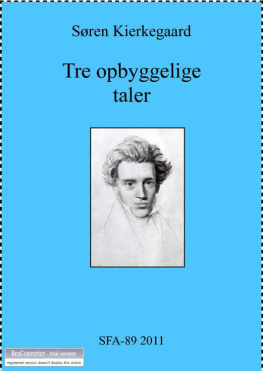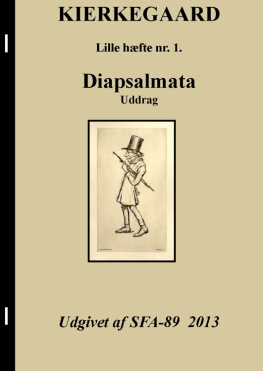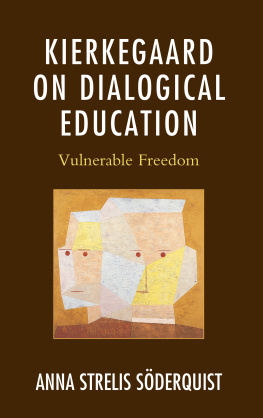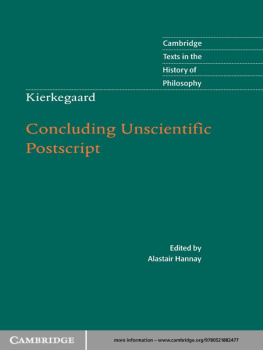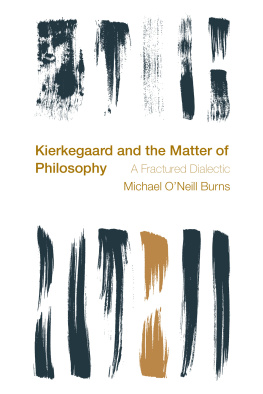Kierkegaard - Concluding Unscientific Postscript to Philosophical Fragments
Here you can read online Kierkegaard - Concluding Unscientific Postscript to Philosophical Fragments full text of the book (entire story) in english for free. Download pdf and epub, get meaning, cover and reviews about this ebook. year: 1992, publisher: Princeton University Press, genre: Romance novel. Description of the work, (preface) as well as reviews are available. Best literature library LitArk.com created for fans of good reading and offers a wide selection of genres:
Romance novel
Science fiction
Adventure
Detective
Science
History
Home and family
Prose
Art
Politics
Computer
Non-fiction
Religion
Business
Children
Humor
Choose a favorite category and find really read worthwhile books. Enjoy immersion in the world of imagination, feel the emotions of the characters or learn something new for yourself, make an fascinating discovery.

- Book:Concluding Unscientific Postscript to Philosophical Fragments
- Author:
- Publisher:Princeton University Press
- Genre:
- Year:1992
- Rating:4 / 5
- Favourites:Add to favourites
- Your mark:
- 80
- 1
- 2
- 3
- 4
- 5
Concluding Unscientific Postscript to Philosophical Fragments: summary, description and annotation
We offer to read an annotation, description, summary or preface (depends on what the author of the book "Concluding Unscientific Postscript to Philosophical Fragments" wrote himself). If you haven't found the necessary information about the book — write in the comments, we will try to find it.
Concluding Unscientific Postscript to Philosophical Fragments — read online for free the complete book (whole text) full work
Below is the text of the book, divided by pages. System saving the place of the last page read, allows you to conveniently read the book "Concluding Unscientific Postscript to Philosophical Fragments" online for free, without having to search again every time where you left off. Put a bookmark, and you can go to the page where you finished reading at any time.
Font size:
Interval:
Bookmark:
CONCLUDING UNSCIENTIFIC POSTSCRIPT TO PHILOSOPHICAL FRAGMENTS
VOLUME I
KIERKEGAARDS WRITINGS, XII. 1

by Sren Kierkegaard
VOLUME I: TEXT
Edited and Translated
with Introduction and Notes by
Howard V. Hong and
Edna H. Hong

Copyright 1992 by Howard V. Hong
Published by Princeton University Press,
41 William Street, Princeton, New Jersey 08540
In the United Kingdom: Princeton University Press, Oxford
All Rights Reserved
Library of Congress Cataloging-in-Publication Data
Kierkegaard, Sren, 1813-1855.
[Afsluttende uvidenskabelig efterskrift English]
Concluding unscientific postscript to Philosophical fragments / by Sren Kierkegaard ; edited and translated with introduction and notes by Howard V. Hong and Edna H. Hong.
p cm.(Kierkegaards writings ; 12)
Translation of: Afsluttende uvidenskabelig efterskrift
Includes index.
ISBN 0-691-07395-3 (v. 1 . alk. paper)ISBN 0-691-02081-7 (pbk. v. 1)
ISBN 0-691-07395-3 (v. 2 : alk. paper)ISBN 0-691-02081-7 (pbk : v. 2)
1. ChristianityPhilosophy. 2. Apologetics19th century.
I. Hong, Howard Vincent, 1912- II. Hong, Edna Hatlestad, 1913- III. Title
IV. Series Kierkegaard, Sren, 1813-1855. Works.
English. 1978; 12.
B4373.A472E5 1992
201dc20 91-4093
Preparation of this volume has been made possible in part by a grant from
the Division of Research Programs of the National Endowment
for the Humanities, an independent federal agency
Princeton University Press books are printed
on acid-free paper and meet the guidelines for permanence and durability
of the Committee on Production Guidelines for Book Longevity
of the Council on Library Resources
Designed by Frank Mahood
Printed in the United States of America by Princeton
University Press, Princeton, New Jersey
1357910 8642
Part One
THE OBJECTIVE ISSUE OF THE TRUTH OF CHRISTIANITY
CHAPTER I
The Historical Point of View
CHAPTER II
The Speculative Point of View
Part Two
THE SUBJECTIVE ISSUE, THE SUBJECTIVE INDIVIDUALS RELATION TO THE TRUTH OF CHRISTIANITY, OR BECOMING A CHRISTIAN
Section I
SOMETHING ABOUT LESSING
CHAPTER I
An Expression of Gratitude to Lessing
CHAPTER II
Possible and Actual Theses by Lessing
Section II
THE SUBJECTIVE ISSUE, OR HOW SUBJECTIVITY MUST BE CONSTITUTED IN ORDER THAT THE ISSUE CAN BE MANIFEST TO IT
CHAPTER I
Becoming Subjective
What ethics would have to judge if becoming subjective were not the highest task assigned to a human being; what must be disregarded in a closer understanding of this task; examples of thinking oriented to becoming subjective
CHAPTER II
Subjective Truth, Inwardness; Truth Is Subjectivity
APPENDIX
A Glance at a Contemporary Effort in Danish Literature
CHAPTER III
Actual Subjectivity, Ethical Subjectivity; the Subjective Thinker
CHAPTER IV
The Issue in Fragments: How Can an Eternal Happiness Be Built on Historical Knowledge?
DIVISION 1
For Orientation in the Plan of Fragments
DIVISION 2
The Issue Itself
The individuals eternal happiness is decided in time through a relation to something historical that furthermore is historical in such a way that its composition includes that which according to its nature cannot become historical and consequently must become that by virtue of the absurd
A
PATHOS
B
THE DIALECTICAL
APPENDIX TO B
The Retroactive Effect of the Dialectical on Pathos Leading to a Sharpened Pathos, and the Contemporaneous Elements of This Pathos
CHAPTER V
Conclusion
APPENDIX
An Understanding with the Reader
CONCLUDING UNSCIENTIFIC POSTSCRIPT
TO PHILOSOPHICAL FRAGMENTS
A MIMICAL-PATHETICAL-DIALECTICAL COMPILATION AN EXISTENTIAL CONTRIBUTION
by
JOHANNES CLIMACUS
Edited by
S. Kierkegaard
A , , ; , ,
[But I must ask you, Socrates, what do you suppose is the upshot of all this? As I said a little while ago, it is the scrapings and shavings of argument, cut up into little bits].
Greater Hippias, 304 a
Rarely, perhaps, has a literary undertaking been so favored by fate in accord with the authors wishes as has my Philosophical Fragments. Doubtful and reticent as I am with regard to every private opinion and self-appraisal, I do without any doubt dare to say truthfully one thing concerning the fate of the little pamphlet:a mistake is always possible.[VII vi] Literary mistakes of that kind belong to the order of the day.
Fate be praised, therefore, that it did not happen. Without any commotion whatever, without the shedding of blood and ink, the pamphlet has remained unnoticedit has not been reviewed, not mentioned, anywhere; no literary clangor about it has increased the ferment; no scholarly outcry has led the expectant host astray; no shouting about it from the outpost One comes to owe them everything, yet without even being able to pay off this debt with a new book, because the importance of the new book, if it comes to have any, will in turn be due to the art and help of these benefactors.
Encouraged by this favor of fate, I now intend to proceed. Without being hampered by anything or any hasty connection with the demands of the times, solely following my inner promptings, I continue, as it were, to knead my thoughts until, to my notion, the dough is good.[VII vii] Somewhere Aristotle states that people in his day set up the ludicrous rule for the narrative that it must move fast, and, he continues, Here the answer applies that was given to the one kneading dough when he asked whether he was to make the dough stiff or soft: What, isnt it possible to make the dough just right? is precisely illiberal.
What is offered here is again a pamphlet proprio marte, proprio stipendio, propriis auspiciis [by ones own hand, at ones own expense, on ones own behalf].
J. C.
You will perhaps recall, my dear reader, that there was a remark at the end of Philosophical Fragments (p. 162), something that might look like the promise of a sequel. Regarded as a promise [Lfte], that remark (if I ever do write a second section) was certainly as casual as possible, as far as possible from a solemn pledge [Tro-Lovelse]. Therefore I have not felt bound by that promise, even though from the beginning it was my intent to fulfill it and the prerequisites were already on hand concurrently with the promise. Accordingly, the promise could very well have been made with great formality, in optima forma [in the best form], but it would have been inconsistent to publish a pamphlet so constituted that it was not able, and did not want, to cause a sensation and then in it to make a formal promise that, if nothing else, is bound to cause a sensation and certainly would have caused an enormous sensation. You know how these things happen. An author publishes a very sizable book; it has been out scarcely a week when by chance he falls into conversation with a reader who, in a glow of longing, courteously and congenially asks if he will not write a new book soon. The author is enthralledto have a reader who so quickly works his way through a big book and, despite the labor, retains a keen desire. Alas, the poor deceived author! In the course of the conversation, that sympathetically interested reader of the book, who so ardently looks forward to the new book, admits, yes, he admits that he has not even read it and probably never will find the time to do so, but at a social gathering he had attended he had heard [VII 2] mention of a new book by the same author, and to make certain of this matter is of extraordinary concern to him.
Next pageFont size:
Interval:
Bookmark:
Similar books «Concluding Unscientific Postscript to Philosophical Fragments»
Look at similar books to Concluding Unscientific Postscript to Philosophical Fragments. We have selected literature similar in name and meaning in the hope of providing readers with more options to find new, interesting, not yet read works.
Discussion, reviews of the book Concluding Unscientific Postscript to Philosophical Fragments and just readers' own opinions. Leave your comments, write what you think about the work, its meaning or the main characters. Specify what exactly you liked and what you didn't like, and why you think so.

